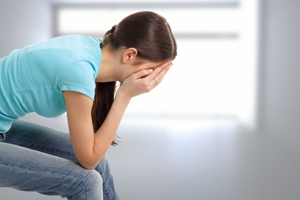
Symptoms used to diagnose depression are the same regardless of gender, although complaints vary from person to person.
Depression can manifest differently in different people, causing sadness and a loss of interest in once pleasurable activities. Symptoms used to diagnose depression are the same regardless of gender, although complaints vary from person to person.
Fatigue — Depressed people undergo a series of physical and emotional changes, including fatigue and psychomotor retardation, which is a slowing down of physical movements, speech and thought processes.
Sleep problems — Sleeping too much or too little, insomnia, waking up very early or excessive sleeping are common depression symptoms.
Stomachache or backache — Health problems, such as constipation or diarrhea, and headaches and back pain are common in the depressed.
Irritability — Instead of seeming down, men who are depressed often exhibit signs of irritability. Negative thoughts are a common aspect of depression.
Difficulty concentrating — Psychomotor retardation can slow down the ability to process information, thereby impairing concentration on work or other tasks.
Anger or hostility — Some men manifest depression by being hostile, angry or aggressive. Anger and hostility are different than irritability. Anger tends to be a stronger emotion.
Stress — Research has shown that prolonged stress can lead to changes in the body and brain, which in turn can lead to depression.
Anxiety — Research has shown a strong link between anxiety disorders and depression.
Substance abuse — Substance abuse frequently accompanies depression. Research has shown that alcoholics are almost twice as likely to suffer from major depression than people without a drinking problem.
Sexual dysfunction — Depression is a common reason for erectile dysfunction and loss of sexual desire, and it is one symptom that men are inclined not to report.
Indecision — Some people naturally have a hard time making decisions, so an inability to make choices is usually worrisome only if it is a new behavior. Depression can hamper one’s ability to decide.
Suicidal thoughts — Women are more likely to attempt suicide, but men are more than four times as likely to die if they do attempt suicide.
Source: Lisa Zamosky at www.health.com.
Reprinted from AzNetNews, Volume 31, Number 1, Feb/Mar 2012.





March 1, 2012
Coping, Decision / Indecision, Depression, Emotional Wellness and Well-being, Fatigue